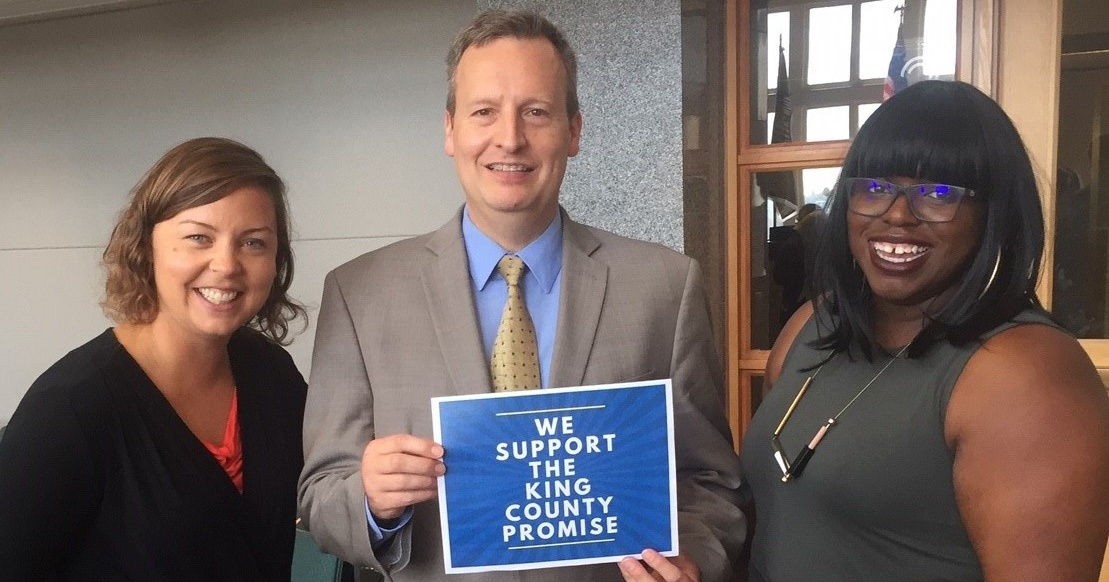
Kyla Lackie and Mercy Daramola of the Puget Sound Educational Service District with Councilmember Dave Upthegrove at a King County Council meeting.
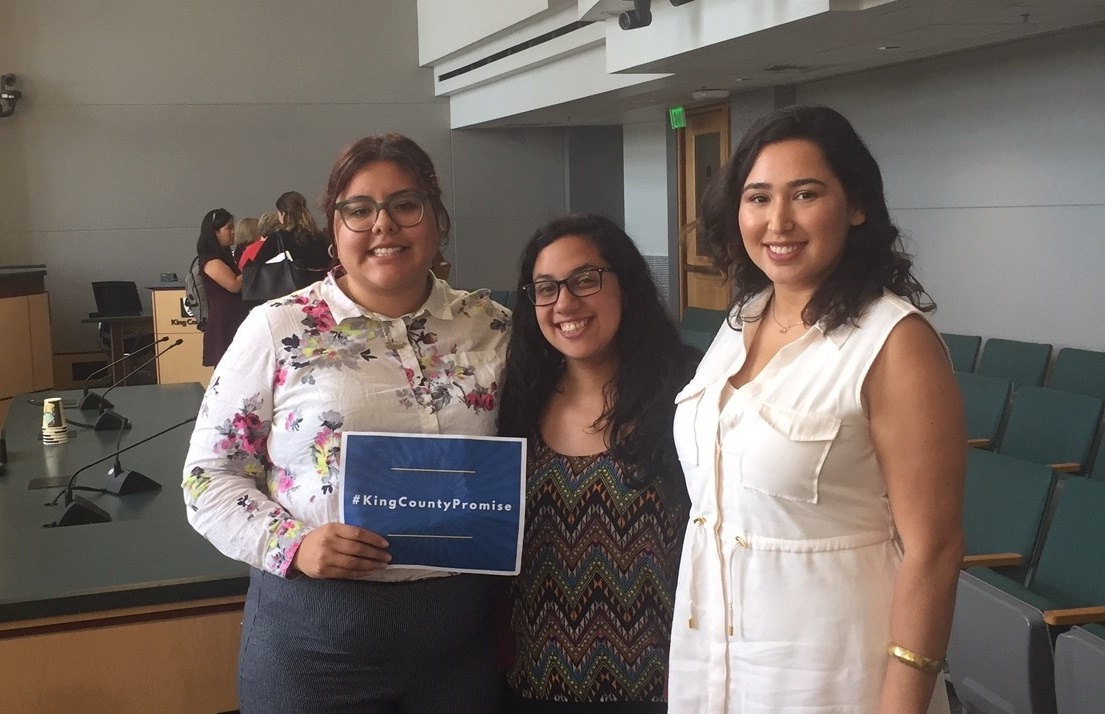
CCER staff Larissa Reza and Alejandra Pérez with UW Gear Up Achievers' Marycarmen Becerra-Nuñez.

Councilmember Jeanne Kohl- Welles, Renton Technical College President Kevin McCarthy, CCER's Larissa Reza, Alejandra Pérez, and Mary Jean Ryan, and Seattle Colleges Chancellor Shouan Pan and Steven Leahy, also of Seattle Colleges.
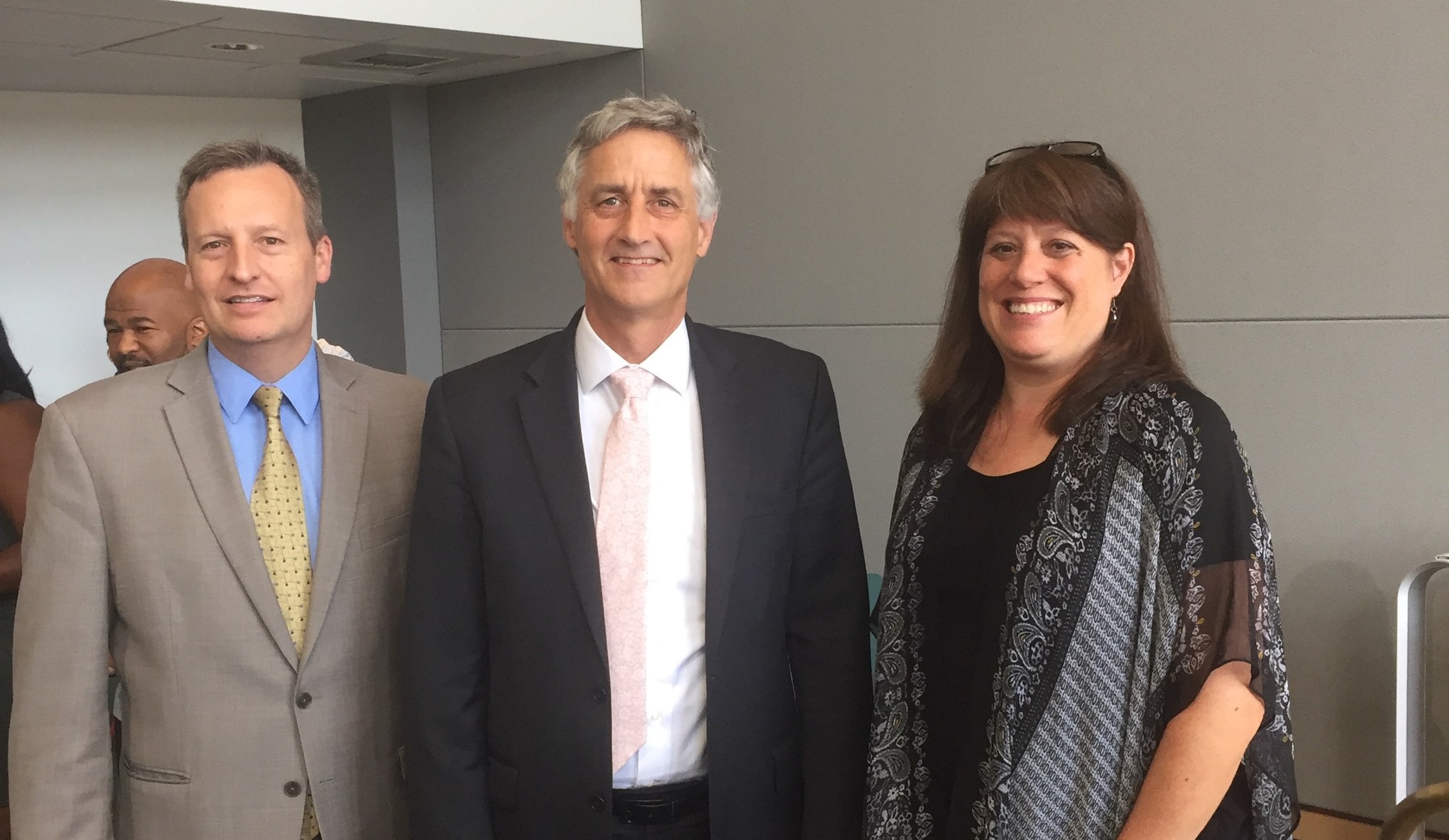
Councilmember Dave Upthegrove, Renton Technical College President Kevin McCarthy, and Councilmember Claudia Balducci.
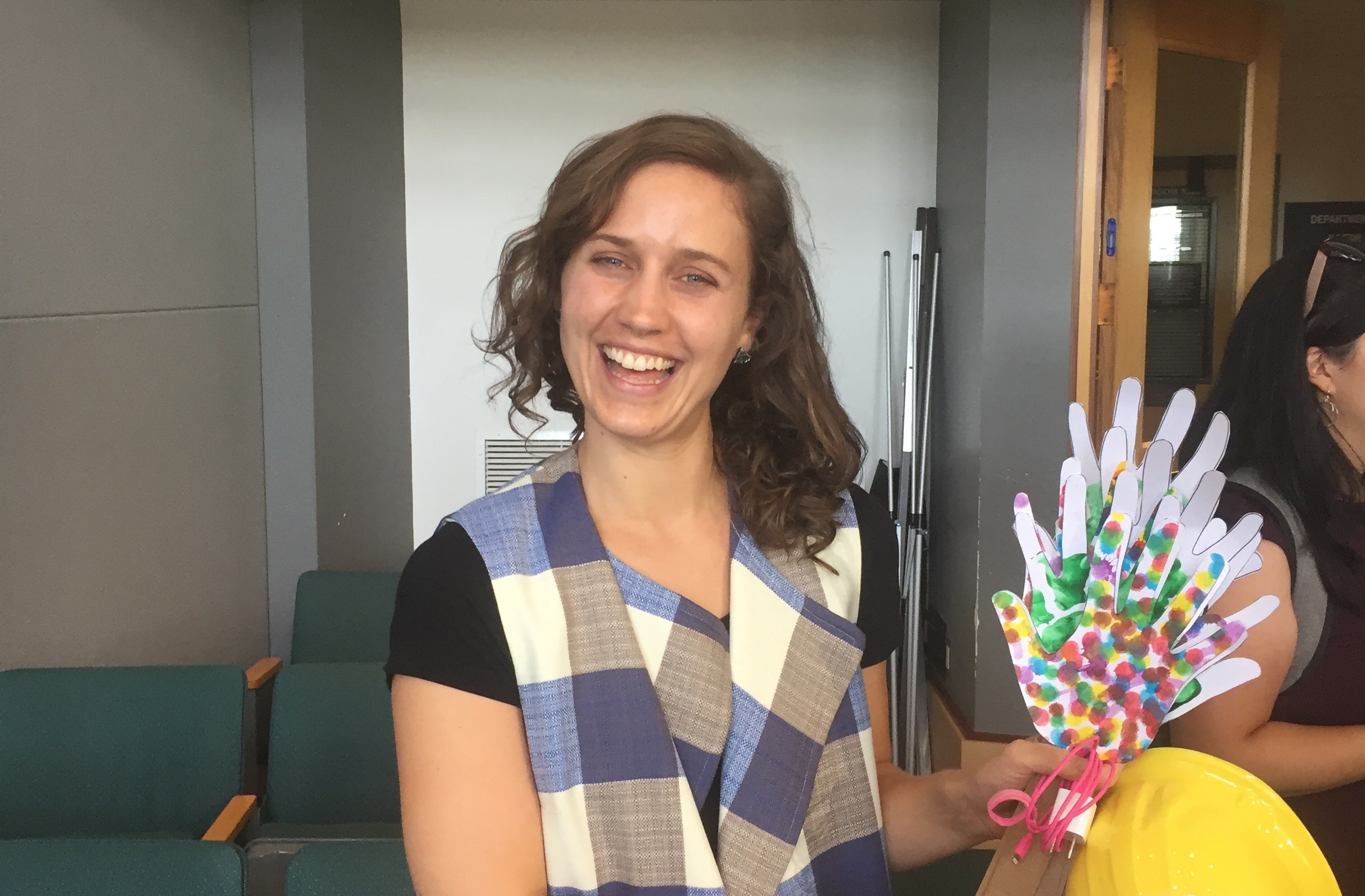
Child Care Resources Policy and Advocacy Manager Sarah Brady.
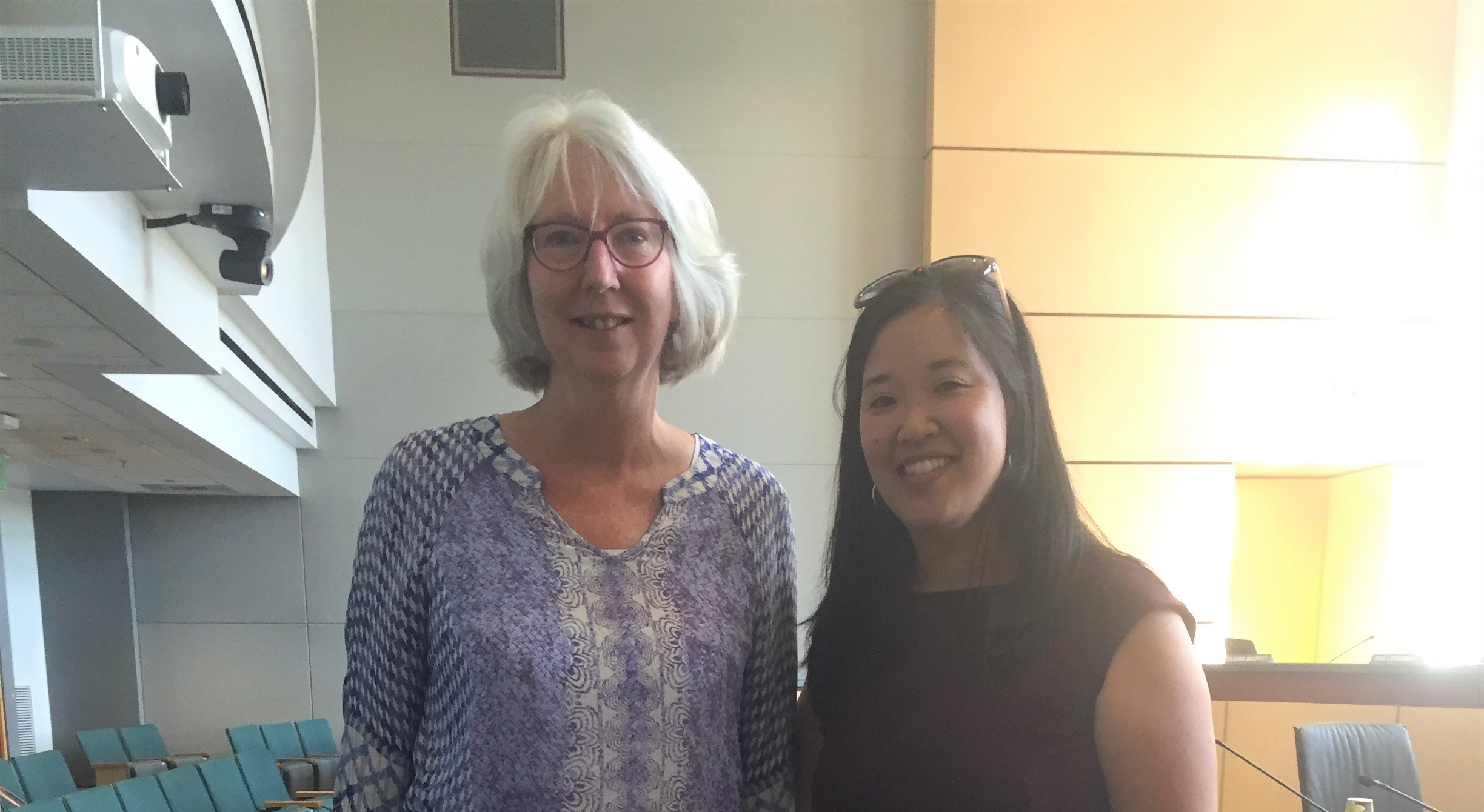
CCER's Mary Jean Ryan and early education advocate Leslie Dozono.
The King County Council voted on Aug. 28 to set priorities for how they will spend the $318 million fund known as the Puget Sound Taxpayer Accountability Account in our region. The once-in-a-generation pool of funds will be invested by King County over the next 15 years to improve educational outcomes. The proposal development, advocacy, and ultimate passing of this legislation has been a work in progress for three years. CCER’s executive director, Mary Jean Ryan, describes the PSTAA journey, how it came to be, and why it is so significant.
The late-night amendment that seemed too good to be true
In late spring 2015, state legislative leaders were still working to gather votes to pass Sound Transit 3 legislation. Jessyn Farrell, a legislator from Seattle, penned a late-night compromise amendment that greatly aided final passage. With Jessyn’s amendment, ST3 would move ahead and the state would collect a new tax on the construction costs as the rail system got built. The proceeds of that tax would be sent back to the counties in the Sound Transit service area and used to fund education-related investments for underserved students. The specific use of the funds would be determined by each of the three counties in which Sound Transit operates: King, Pierce, and Snohomish.
As is often the case with brilliant late-night legislative maneuvers, few people knew about it. I found out about the “Jessyn amendment” through Suzanne Dale Estey, a CCER board member and government affairs expert, who happened to be watching late one night TVW live legislative session coverage. Suzanne told us she heard this amazing amendment offered on the ST3 legislation and she could not believe her ears. We went to find the law (117 pages long) and the clause in question. Sure enough, it was as amazing as she said. So we went to work. I always believe in reading the underlying legislation—you learn a lot.
I talked to a few county officials, and they had not yet heard about the amendment. We read the law carefully and began to think about how this money could have lasting impact. Many who wanted to see high-impact investments worried that politics would push elected officials to spread the money across too many investment areas, minimizing any chance of major impact. I joined many others in urging the decision makers to choose a few big issue areas to focus on and to consider the possibility of leveraging private funds and other public investments.
Why early learning facilities?
The lack of funding for early learning facilities is a major barrier for expansion of early learning, especially in the Road Map Project region. The state has been gradually expanding slots for the Early Childhood Education and Assistance Program, but that money only funds operations, not facilities. The City of Seattle is also expanding early learning and the exact same issue popped up. Given the one-time nature of the PSTAA funding it seemed ideal to use the money for a capital purpose—like building early learning facilities to serve low-income families.
A diverse group of early learning and affordable housing advocates talked to county officials and conducted research on the exact nature of the need and the opportunity. Momentum began to build to ask the county to dedicate a large amount of the PSTAA proceeds for early learning facilities.
Advocates encountered a roadblock when county lawyers said the “Jessyn amendment” was not explicit about allowing funds to be spent for capital purposes. Advocates had to organize to get the state legislature to clarify that point by amendment during the 2019 session. Their efforts paid off, and the amendment was made.
Why culturally-specific community-based organizations?
Even with decades of investment and effort, stark achievement gaps persist for students of color. One of the barriers students of color face in school is the lack of culturally relevant teaching and guidance. Community-based services can provide much-needed student support.
By connecting youth to their cultural heritage, tangible progress can be made to close the achievement gap. Building capacity of culturally-specific community-based organizations is a focus area within the Road Map Project Equity Essentials. To fully support students, we need a diverse educator base that provides an inclusive learning environment.
United Way of King County provided advocacy support for a K-12 focused coalition of 15 people-of-color-led nonprofits, chaired by Estela Ortega of El Centro de la Raza and Michael Byun of Asian Counseling and Referral Service. The coalition cited the power and importance of positive racial and cultural-identity development and the need to support students of color outside of traditional systems.
Why make a “Promise”?
Despite years of work and some gains in high school graduation rates, the rates of college enrollment have not improved overall. Neither has the region’s rate of postsecondary attainment for low-income students growing up in South King County.
After seeing voters approve the Seattle Promise in 2018, the Puget Sound Coalition for College and Career Readiness began to discuss the potential power of a student postsecondary success support system that reaches beyond Seattle. The Puget Sound Educational Service District staffs the coalition, plus the Puget Sound College and Career Network, and helped lead this advocacy effort. It involved developing a comprehensive proposal that would significantly increase college advising support at high-poverty high schools, in community colleges, and in the community in order to reach opportunity youth and other underserved students prioritized under PSTAA.
The state legislature made tremendous progress on higher ed in the 2019 session, and for the first time, committed to fully funding the Washington College Grant (formerly the State Need Grant). This meant the King County Promise could focus on building up the student support systems and rely on the state for the tuition assistance.
In the spring of 2019, an advocacy boost came from the release of our report, Let Us Succeed. One of the report’s important findings is the majority of students of color say they want more college navigation support from their schools. Councilmember Joe McDermott attended a presentation of the report at a Road Map Project convening in June and heard from students in favor of the Promise.
This effort took time and coordination and collaboration across many sectors and groups. Promise advocates first testified at a King County Council hearing summer 2017. Community leaders joined advocacy efforts, as did nonprofit partners that help students with postsecondary navigation. The Washington Bus got involved in outreach at community college campuses. Hundreds of students signed a petition supporting the Promise and in the early summer 2019 the petition was delivered to the county council. The statewide College Promise Coalition weighed in with key strategic support. Community college presidents, K-12 superintendents, current and former students, guidance counselors, business and labor representatives also stepped in. And (on the day of the final vote), councilmembers spoke about the need to help the region’s youth reach their college goals. The advocacy work was extensive, including daily sunrise calls for many weeks in a row. We hope the Promise implementation will guide the state in how they direct future investments.
This kind of intense collaborative work is my favorite kind of work. It is a great example of tenacious people from all sectors sharing a big goal and working well as a team on behalf of our young people..
Now What?
The proceeds of the Puget Sound Taxpayer Accountability Account (PSTAA) will provide:
- $153.8 million to develop early learning facilities
- $29.6 million to support community-based organizations working with students in the K–12 grades
- $112.4 million to the King County Promise, which provides advising support for underserved high school and college students to get them to and through college
- $22.6 million for administration and evaluation support
Our work continues. The next phase will involve working with the County staff on implementation plans. The plans are due back to the Council in about 8 months. Stay tuned!
Posted in: Action Teams , College and Career Readiness , College and Career Success , Data and Research , Early Learning & Elementary Success , Education Results Networking Meetings , Expanded Learning Opportunities